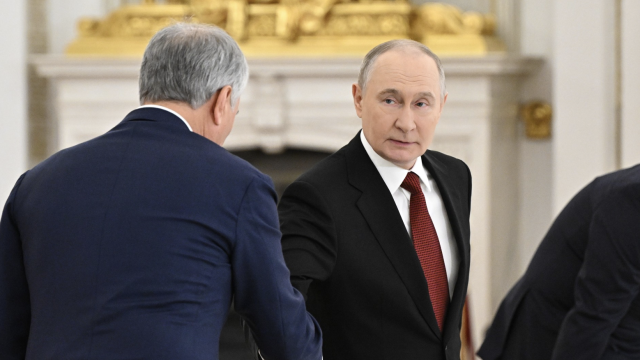WASHINGTON — U.S. Republican objections to the New START arms reduction treaty are "red herrings" that could thrust the two countries into a dangerous era of uncertainty, a senior U.S. official said.
Undersecretary of State Ellen Tauscher, who led the U.S. side negotiating the treaty, said it was important that the Senate ratify the treaty next month or it may lose the chance to engage with Russia on a range of arms control efforts.
"We've had a lot of controversy about this that I think frankly is a lot of red herrings," Tauscher told an audience Monday at the U.S. Institute for Peace, a Washington think tank.
"While nuclear weapons can be considered to be political, arms reduction treaties should not be. This has taken on an air of being politicized way beyond where it should be," she said.
Presidents Barack Obama and Dmitry Medvedev signed New START in April, committing the former Cold War foes to cut deployed nuclear weapons by about 30 percent, in what was hailed as the most prominent dividend of Obama's effort to "reset" relations with the Kremlin.
Proponents of the treaty say while the reduction in nuclear warheads is important, the most significant element of the accord is that it continues the verification and monitoring regime that expired with the end of the START I treaty.
Republicans — who control enough votes in the Senate to block its passage — have voiced concern that the treaty may limit U.S. anti-missile defenses. They also say it should be matched by a commitment to modernize U.S. nuclear forces.
Obama has said he hopes the Senate will act on the treaty during the "lame duck" session of Congress that begins on Monday, but it was unclear whether Republicans would permit ratification.
"We presume that decisions will be made this week between the White House and leadership on whether or not this would be on the agenda for the lame duck," said Mark Helmke, a spokesman for Senator Richard Lugar, the top Republican on the Foreign Relations Committee and a backer of the treaty.
Secretary of State Hillary Clinton said last week that she believed the White House has enough votes to pass the measure. But Tauscher said on Monday she would not act as a "Las Vegas bookmaker" by projecting the odds of passage.
"All the questions have been asked and answered," Tauscher said. "It's important that we get it done. Our last opportunity to do it coming forward is in the lame duck. I think that frankly, because of the way the numbers are working, it's the best opportunity to do it."
Tauscher said failure to ratify the treaty would deprive the United States of its ability to effectively monitor and verify Russia's nuclear activities.
She said delaying U.S. ratification of the treaty was already sowing doubts in Moscow, which could affect a wide range of cooperation on arms control.
A Message from The Moscow Times:
Dear readers,
We are facing unprecedented challenges. Russia's Prosecutor General's Office has designated The Moscow Times as an "undesirable" organization, criminalizing our work and putting our staff at risk of prosecution. This follows our earlier unjust labeling as a "foreign agent."
These actions are direct attempts to silence independent journalism in Russia. The authorities claim our work "discredits the decisions of the Russian leadership." We see things differently: we strive to provide accurate, unbiased reporting on Russia.
We, the journalists of The Moscow Times, refuse to be silenced. But to continue our work, we need your help.
Your support, no matter how small, makes a world of difference. If you can, please support us monthly starting from just $2. It's quick to set up, and every contribution makes a significant impact.
By supporting The Moscow Times, you're defending open, independent journalism in the face of repression. Thank you for standing with us.
Remind me later.





